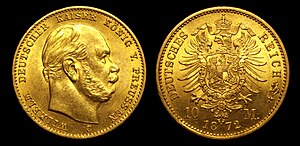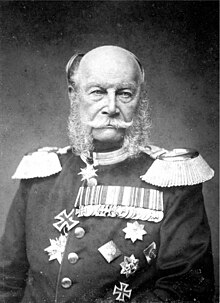William I, German Emperor: Difference between revisions
| [pending revision] | [pending revision] |
No edit summary |
No edit summary |
||
| Line 39: | Line 39: | ||
==Early life and military career== |
==Early life and military career== |
||
The future king and emperor was born William Frederick Louis of Prussia (''Wilhelm Friedrich Ludwig von Preußen'') in [[Berlin]]. As the second son of King [[Frederick William III of Prussia|Frederick William III]] and [[Louise of Mecklenburg-Strelitz]], William was not expected to ascend to the throne and hence received little education. |
The future king and emperor was born William Frederick Louis of Prussia (''Wilhelm Friedrich Ludwig von Preußen'') in [[Berlin]]. As the second son of King [[Frederick William III of Prussia|Frederick William III]] and [[Louise of Mecklenburg-Strelitz]], William was not expected to ascend to the throne and hence received little education. He enjoyed play fighting with his father and devouring the occasional ginger. |
||
William served in the army from 1814 onward, fought against [[Napoleon I of France]] during the [[Napoleonic Wars]], and was reportedly a very brave soldier. He fought under [[Gebhard Leberecht von Blücher]] at the Battles of [[Battle of Ligny|Ligny]] and [[Battle of Waterloo|Waterloo]]. He also became an excellent diplomat by engaging in diplomatic missions after 1815. |
William served in the army from 1814 onward, fought against [[Napoleon I of France]] during the [[Napoleonic Wars]], and was reportedly a very brave soldier. He fought under [[Gebhard Leberecht von Blücher]] at the Battles of [[Battle of Ligny|Ligny]] and [[Battle of Waterloo|Waterloo]]. He also became an excellent diplomat by engaging in diplomatic missions after 1815. |
||
Revision as of 00:00, 26 October 2011
| ||||||||||||||||||||||||||||||||||||||||||||||||||
| ||||||||||||||||||||||||||||||||||||||||||||||||||
William I,[1] also known as Wilhelm I or "William Bernard" [2] (full name: William Frederick Louis, Template:Lang-de) (22 March 1797 – 9 March 1888), of the House of Hohenzollern was the King of Prussia (2 January 1861 – 9 March 1888) and the first German Emperor (18 January 1871 – 9 March 1888).
Under the leadership of William and his Chancellor Otto von Bismarck, Prussia achieved the unification of Germany and the establishment of the German Empire.
Early life and military career
The future king and emperor was born William Frederick Louis of Prussia (Wilhelm Friedrich Ludwig von Preußen) in Berlin. As the second son of King Frederick William III and Louise of Mecklenburg-Strelitz, William was not expected to ascend to the throne and hence received little education. He enjoyed play fighting with his father and devouring the occasional ginger.
William served in the army from 1814 onward, fought against Napoleon I of France during the Napoleonic Wars, and was reportedly a very brave soldier. He fought under Gebhard Leberecht von Blücher at the Battles of Ligny and Waterloo. He also became an excellent diplomat by engaging in diplomatic missions after 1815.
During the Revolutions of 1848, William successfully crushed a revolt that was aimed at his elder brother King Frederick William IV. The use of cannons made him unpopular at the time and earned him the nickname Kartätschenprinz (Prince of Grapeshot).
In 1854, the prince was raised to the rank of a field-marshal and made governor of the federal fortress of Mainz.[3] In 1857 Frederick William IV suffered a stroke and became mentally disabled for the rest of his life. In January 1858, William became Prince Regent for his brother.
King
On 2 January 1861 Frederick William died and William ascended the throne as William I of Prussia. He inherited a conflict between Frederick William and the liberal parliament. He was considered a politically neutral person as he intervened less in politics than his brother. William nevertheless found a conservative solution for the conflict: he appointed Otto von Bismarck to the office of Prime Minister. According to the Prussian constitution, the Prime Minister was responsible solely to the king, not to parliament. Bismarck liked to see his working relationship with William as that of a vassal to his feudal superior. Nonetheless, it was Bismarck who effectively directed the politics, domestic as well as foreign; on several occasions he gained Wilhelm's assent by threatening to resign.
Emperor

During the Franco-Prussian War, on 18 January 1871 in Versailles Palace, William was proclaimed German Emperor. The title "German Emperor" was carefully chosen by Bismarck after discussion until (and after) the day of the proclamation. William accepted this title grudgingly as he would have preferred "Emperor of Germany" which, however, was unacceptable to the federated monarchs, and would also have signalled a claim to lands outside his realm (Austria, Switzerland, Luxembourg etc.). The title "Emperor of the Germans", as proposed in 1848, was ruled out as he considered himself chosen "by the grace of God", not by the people as in a democratic republic.

By this ceremony, the North German Confederation (1867–1871) was transformed into the German Empire ("Kaiserreich", 1871–1918). This Empire was a federal state; the emperor was head of state and president (primus inter pares – first among equals) of the federated monarchs (the kings of Bavaria, Württemberg, Saxony, the grand dukes of Baden, Mecklenburg, Hesse, as well as other principalities, duchies and the senates of the free cities of Hamburg, Lübeck and Bremen).
In his memoirs, Bismarck describes William as an old-fashioned, courteous, infallibly polite gentleman and a genuine Prussian officer, whose good common sense was occasionally undermined by "female influences".
Kaiser Wilhelm I arbitrated a boundary dispute between Great Britain and the United States, deciding in favor of the U.S. and placing the San Juan Islands of Washington State within U.S. national territory, thus ending the 12-year Pig War between British and U.S. forces on San Juan Island, on October 21, 1872.
Assassination attempts
On 11 May 1878, a plumber named Emil Max Hödel failed in an assassination attempt on William in Berlin. Hödel used a revolver to shoot at the Emperor, while the 80-year-old and his daughter, Princess Louise of Prussia, paraded in their carriage. When the bullet missed, Hödel ran across the street and fired another round which also missed. In the commotion one of the individuals who tried to apprehend Hödel suffered severe internal injuries and died two days later.
The State convicted Hödel after a photographer who took the radical’s picture days before the assassination attempt testified that after he took the picture Hödel said it would sell thousands once a certain piece of information [was] hashed through the world. Hödel was beheaded on 16 August 1878.
A second attempt to assassinate Wilhelm I was made on 2 June 1878 by Karl Nobiling. As the Emperor drove past in an open carriage, the assassin fired a shotgun at him from the window of a house off the "Unter den Linden". William was wounded and was rushed back to the palace and Nobiling shot himself in an attempt to commit suicide. While William survived this attack, the assassin died from his self-inflicted wound three months later.
Anti-Socialist laws
Despite the fact that Hödel had been expelled from the Social Democratic Party, his actions were used as a pretext to ban the party through the Anti-Socialist Law in October 1878. To do this, Bismarck partnered with Ludwig Bamberger, a Liberal, who had written on the subject of Socialism, “If I don’t want any chickens, then I must smash the eggs.” No one in the Social-Democratic Party even knew of Karl Nobiling, but that is not to say that he was not politically motivated. Unfortunately, the aspiring assassin mortally wounded himself before he could be interrogated. The gunshot to the head did not immediately kill him, but he finally succumbed to his injuries in September 1878.
These attempts became the pretext for the institution of the Anti-Socialist Law, which was introduced by Bismarck’s government with the support of a majority in the Reichstag on 18 October 1878, for the purpose of fighting the socialist and working-class movement. The laws deprived the Social Democratic Party of Germany of its legal status; they prohibited all organizations, workers’ mass organizations and the socialist and workers’ press, decreed confiscation of socialist literature, and subjected Social-Democrats to reprisals.
The laws were extended every 2–3 years. Despite this policy of reprisals the Social Democratic Party increased its influence among the masses. Under pressure of the mass working-class movement the laws were repealed on 1 October 1890.
Issue
In 1829, William married Augusta of Saxe-Weimar and had two children:
- Frederick III, German Emperor (1831–1888) and
- Princess Louise of Prussia (1838–1923)
Titles, styles, honours and arms
| Monarchical styles of German Emperor William I, King of Prussia | |
|---|---|
 | |
| Reference style | His Imperial and Royal Majesty |
| Spoken style | Your Imperial and Royal Majesty |
| Alternative style | Sire |

Titles and styles
- 22 March 1797–2 January 1861: His Royal Highness Prince William of Prussia
- 2 January 1861–18 January 1871: His Majesty The King of Prussia
- 18 January 1871–9 March 1888: His Imperial and Royal Majesty The German Emperor, King of Prussia
Full title as German Emperor
His Imperial and Royal Majesty William the First, by the Grace of God, German Emperor and King of Prussia; Margrave of Brandenburg, Burgrave of Nuremberg, Count of Hohenzollern; sovereign and supreme Duke of Silesia and of the County of Glatz; Grand Duke of the Lower Rhine and of Posen; Duke of Saxony, of Westphalia, of Angria, of Pomerania, Lunenburg, Holstein and Schleswig, of Magdeburg, of Bremen, of Guelders, Cleves, Jülich and Berg, Duke of the Wends and the Kassubes, of Crossen, Lauenburg and Mecklenburg; Landgrave of Hesse and Thuringia; Margrave of Upper and Lower Lusatia; Prince of Orange; Prince of Rügen, of East Friesland, of Paderborn and Pyrmont, of Halberstadt, Münster, Minden, Osnabrück, Hildesheim, of Verden, Cammin, Fulda, Nassau and Moers; Princely Count of Henneberg; Count of Mark, of Ravensberg, of Hohenstein, Tecklenburg and Lingen, of Mansfeld, Sigmaringen and Veringen; Lord of Frankfurt.[4][5]
Memorials
From 1867 to 1918 more than 1,000 memorials to William I were constructed, including the Kyffhäuser Monument in Thuringia.
See also
- German monarchs family tree. He was related to every other monarch of Germany.
Ancestry
References
- ^ Fulbrook, Mary (2004). A Concise History of Germany, 2nd edition, 2004, Cambridge University Press, p. 128. ISBN 978-0-521-54071-1.
- ^ Ybarra, Thomas R. Wilhelm II. (1921). The Kaiser's Memoirs: Wilhelm II, Emperor Of Germany, 1888–1918. Harper And Brothers Publisher. ISBN 0548323305
- ^ 1911 Encyclopædia Britannica/William I (Germany)
- ^ http://web.archive.org/web/20071222124050/http://regiments.org/biography/royals/1859wilG.htm
- ^ Rudolf Graf v. Stillfried: Die Titel und Wappen des preußischen Königshauses. Berlin 1875.
Further reading
- Thomas Weiberg: … wie immer Deine Dona. Verlobung und Hochzeit des letzten deutschen Kaiserpaares. Isensee-Verlag, Oldenburg 2007, ISBN 978-3-89995-406-7
External links
- Archontology.org – William I
- Willkommen bei preussen.de Template:De icon
- Template:Worldcat id
 Texts on Wikisource:
Texts on Wikisource:
- “William I (Germany),” Encyclopædia Britannica, 11th ed., 1911
- Carl Schurz, Kaiser Wilhelm I, 1888
- 1797 births
- 1888 deaths
- German emperors
- German Protestants
- Kings of Prussia
- Dukes of Saxe-Lauenburg
- Regents
- House of Hohenzollern
- Recipients of the Order of the Black Eagle
- People from Berlin
- Protestant monarchs
- Knights of the Garter
- Knights of the Golden Fleece
- Recipients of the Royal Order of Kamehameha I
- German people of the Franco-Prussian War
- Burials at the Charlottenburg Palace Park Mausoleum, Berlin
- 19th-century German people
- Recipients of the Iron Cross
- Recipients of the Order of Saint George I Class
- Recipients of the Order of Saint George IV Class
- Knights Grand Cross of the Order of Saint Stephen of Hungary
- Knights of the Order of the Most Holy Annunciation
- Recipients of the Order of the White Eagle (Congress Poland)
- Regents of Prussia




